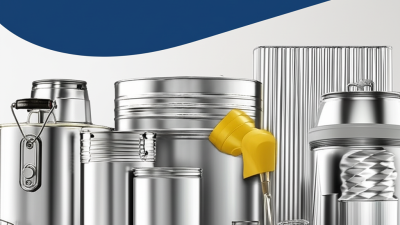 +8618680445103
+8618680445103
Free Standard Samples can be provided for you to check the quality.
Leave Your Message
In recent years, metal containers have emerged as a superior choice for packaging and storage, driven by their unmatched durability and safety features. According to a report by the Plastic Pollution Coalition, over 75% of consumer products are packaged in materials that compromise long-term storage integrity, while studies from the American Packaging Association reveal that metal protects contents from light, moisture, and microbial contamination more effectively than plastic or glass. Additionally, the global metal packaging market is projected to grow significantly, reaching approximately $200 billion by 2025, underscoring the increasing recognition of metal containers’ advantages. This blog will explore five compelling reasons why metal containers not only outperform other options in terms of durability but also enhance safety, making them the preferred choice for industries focused on quality and sustainability.

When it comes to product safety, understanding the importance of metal containers cannot be overstated. Metal containers are renowned for their ability to protect contents from external contaminants, making them a preferred choice in various industries, including food, pharmaceuticals, and chemicals. Their robust nature ensures that they can withstand environmental pressures, avoiding leaks and spills that can compromise product integrity.
Tip: When selecting metal containers, always consider the type of metal used. Stainless steel is often favored due to its resistance to corrosion and high durability, providing an extra layer of safety for your products.
Moreover, metal containers can handle higher temperatures and pressure variations compared to their plastic counterparts. This characteristic helps maintain product stability, especially during transportation and storage. The strength of metal also means reduced risk of breakage, further enhancing safety.
Tip: Be sure to check for food-grade certification if you're using metal containers for consumables. This ensures that the material is safe for contact with food items and complies with safety standards.
Metal containers have long been recognized for their durability and safety, outperforming other materials in several key areas. One of the primary characteristics that enhance the durability of metal containers is their resistance to impact and puncture. According to a report by Smithers Pira, metal packaging can withstand significant stress, making it ideal for transporting goods that require robust protection. For instance, aluminum containers are known to have a tensile strength of around 70 MPa, which allows them to endure external pressures and impacts better than plastic alternatives.
In terms of safety, metal containers excel in maintaining product integrity. A study published in the Journal of Packaging Technology reported that metal is less permeable than plastic, providing a superior barrier against moisture, light, and gases that can compromise product quality. This quality is especially crucial in the food and beverage industry, where metal packaging can extend shelf life significantly—by up to 200% compared to plastic. These characteristics not only enhance the durability of metal containers but also ensure the safety and freshness of the products they contain.
When it comes to food storage, the safety of our materials is more critical than ever. Recent concerns have emerged regarding the use of black plastic cooking utensils, which may be made from recycled electronic materials potentially containing harmful substances. This raises a pivotal question: can we trust these materials for everyday use, especially when alternatives are available?
Metal containers, known for their durability and safety, stand out as superior options. Unlike plastic, they do not leach harmful chemicals into food, making them a safer choice for storing leftovers or preparing meals. While glass and ceramic are also excellent choices, metal containers provide unmatched durability, making them ideal for frequent use without the risks associated with microplastics. As we move toward a more health-conscious and environmentally aware society, choosing metal options significantly reduces concerns about chemical exposure and ensures safer food storage practices.
When selecting metal containers for industrial use, identifying quality suppliers is crucial to ensuring safety and durability. According to a report by MarketsandMarkets, the metal packaging market is projected to reach $180 billion by 2023, driven by an increasing demand for safer and more sustainable packaging solutions. High-quality metal containers are known to provide superior barrier properties, protecting contents from environmental factors better than alternatives like plastic or glass. This reliability is essential in industries such as food and pharmaceuticals, where product integrity is paramount.
Furthermore, a study by the Metal Container Manufacturers Association highlights that metal containers reduce the risk of contamination and leakage, with 95% of containers meeting industry safety standards. Choosing the right supplier means fostering partnerships with manufacturers that prioritize stringent quality control processes and testing. Collaborating with reputable suppliers not only guarantees compliance with regulations but also enhances the overall safety and durability of the containers, ultimately benefiting businesses that rely on these essential packaging solutions for their products.
When it comes to metal packaging, evaluating
supplier credibility and product quality is crucial
for ensuring durability and safety. A reliable supplier plays a
pivotal role in the overall performance of metal containers. It is essential to choose suppliers who
employ stringent quality control measures and adhere to industry standards. Companies that are
transparent about their sourcing, manufacturing processes, and compliance certifications
should be prioritized. This not only guarantees that the metal containers are produced with high-quality
materials but also ensures that they meet safety regulations, reducing the risk of contamination or
chemical leaching.
In addition to evaluating suppliers, assessing product quality is vital. High-quality metal containers
should exhibit superior resistance to environmental factors such as corrosion,
temperature variations, and mechanical stress. A detailed examination of product specifications, customer
reviews, and performance tests can provide insights into a container's durability and safety. Brands that
offer warranties or satisfaction guarantees often indicate confidence in their product quality, making
them more trustworthy. By focusing on these aspects, businesses can select superior metal packaging
solutions that enhance both the safety and longevity of their products while ensuring customer satisfaction.
